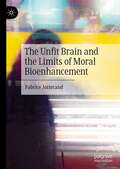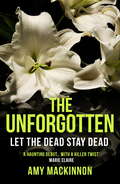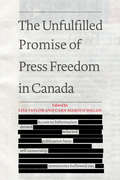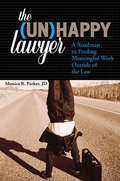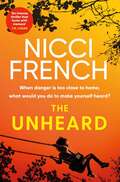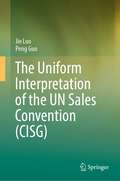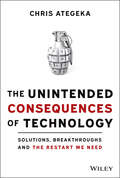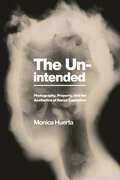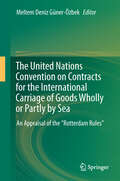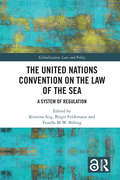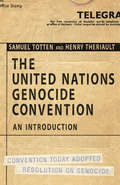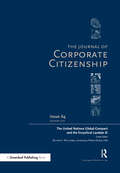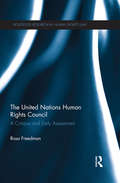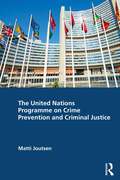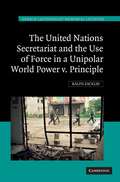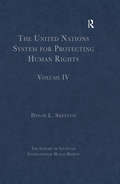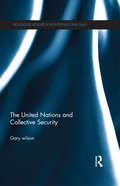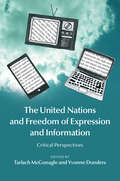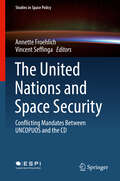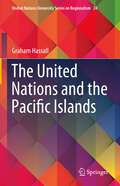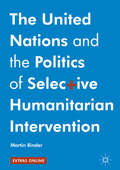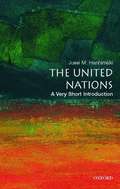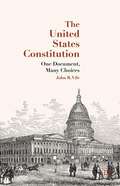- Table View
- List View
The Unfit Brain and the Limits of Moral Bioenhancement
by Fabrice JotterandIn light of the potential novel applications of neurotechnologies in psychiatry and the current debate on moral bioenhancement, this book outlines the reasons why more conceptual work is needed to inform the scientific and medical community, and society at large, about the implications of moral bioenhancement before a possible, highly hypothetical at this point, broad acceptance, and potential implementation in areas such as psychiatry (e.g., treatment of psychopathy), or as a measure to prevent crime in society. The author does not negate the possibility of altering or manipulating moral behavior through technological means. Rather he argues that the scope of interventions is limited because the various options available to “enhance morality” improve, or simply manipulate, some elements of moral behavior and not the moral agent per se in the various elements constitutive of moral agency. The concept of Identity Integrity is suggested as a potential framework for a responsible use of neurotechnologies in psychiatry to avoid human beings becoming orderers and orderables of technological manipulations.
The Unforgotten: The gripping and heartbreaking thriller full of twists and long-held secrets
by Amy MacKinnon'HAUNTING AND MULTILAYERED WITH A KILLER TWIST' - Marie Claire'If you like emotional, gripping crime fiction then you'll love this book' - Amazon reviewer'This is a beautifully written atmospheric mystery that immerses the reader in the life, work and rituals at a funeral parlour.' - Amazon reviewer*******Let the dead stay dead.Clara Marsh is an undertaker. She spends her solitary life among the dead and bids them farewell with a bouquet from her own garden. But Clara's carefully structured life shifts when she discovers a neglected little girl, Trecie, playing in the funeral parlour, desperate for a friend. It changes even more when Detective Mike Sullivan starts questioning her again about a body she prepared three years ago, an unidentified girl found murdered in a nearby strip of woods. Unclaimed by family, the community christened her Precious Doe. When Clara and Mike learn that Trecie may be involved with the same people who killed Precious Doe, Clara must choose between her solitary but steadfast existence and the perils of binding one's life to another. Clara's search for the girl pulls her into a spiralling series of events that threaten to endanger the few people Clara has grown to love - and finally brings her own tragic and long-buried past to the surface.'Such a refreshing read... I've not read anything like it before' - Amazon reviewer'an hypnotic debut... There's a quiet, almost stealthy quality to the writing...Clara is an astonishing character, and with language as blunt as the death she sees every day, she expresses herself with devastating simplicity.' -New York Times Book Review*******PREVIOUSLY PUBLISHED AS TETHERED
The Unfulfilled Promise of Press Freedom in Canada
by Lisa Taylor Cara-Marie O'HaganCanadian news reports are riddled with accounts of Access to Information requests denied and government reports released with large swaths of content redacted. The Unfulfilled Promise of Press Freedom in Canada offers a vast array of viewpoints that critically analyze the application and interpretation of press freedom under the Charter of Rights. This collection, assiduously put together by editors Lisa Taylor and Cara-Marie O’Hagan, showcases the insights of leading authorities in law, journalism, and academia as well as broadcasters and public servants. The contributors explore the ways in which press freedom has been constrained by outside forces, like governmental interference, threats of libel suits, and financial constraints. These intersectional and multifaceted lines of inquiry provide the reader with a 360-degree assessment of press freedom in Canada while discouraging complacency among Canadian citizens. After all, an informed citizenry is a free citizenry.
The Unhappy Lawyer: A Roadmap to Finding Meaningful Work Outside of the Law
by Monica R. ParkerThe Unhappy Lawyer will help you uncover exciting alternative careers with a unique step-by-step program that will make you feel like you have your very own career coach. With chapters containing real letters from lawyers who are desperate to leave the practice of law, tales from lawyers who have shut the door on their legal careers, and powerful exercises, The Unhappy Lawyer provides a witty, no-nonsense roadmap for finding and pursuing engaging work outside of the law.
The Unheard: A Novel
by Nicci French&‘He did kill. Kill and kill and kill.&’ Tess&’s number one priority has always been her three-year-old daughter Poppy. But splitting up with Poppy&’s father Jason means that she cannot always be there to keep her daughter safe. When she finds a disturbing drawing, dark and menacing, among her daughter&’s brightly coloured paintings, Tess is convinced that Poppy has witnessed something terrible. Something that her young mind is struggling to put into words. But no one will listen. It&’s only a child&’s drawing, isn&’t it? Tess will protect Poppy, whatever the price. But when she doesn&’t know what, or who, she is protecting her from, how can she possibly know who to trust . . . ? 'Confirms Nicci French as the giant of the genre' Erin Kelly &‘An intense, brilliantly crafted thriller that hums with menace from start to finish' TM Logan Praise for Nicci French: &‘Expertly paced, psychologically sharp, thoroughly enjoyable' Louise Candlish &‘Meticulously plotted, psychologically astute&’ Sarah Vaughan 'A heart-wrenchingly plausible spiral into paranoia, fear and unbearable tension. Literally pulse-pounding' Christopher Brookmyre 'Totally absorbing. Such great plotting and characters, but also so human and full of insights about ordinary life and relationships. That's what always sets Nicci French&’s work apart - it makes the narrative feel so real' Sabine Durrant 'I love Nicci French&’s books, and with The Unheard they are right at the top of their game. Few crime writers can match their psychological acuity, of their ability to lead a reader through dizzying plot twists without ever losing pace. It&’s an absolute masterclass of crime writing' Kate Rhodes &‘Great writing, razor-sharp plotting, and powerful characterisation. I was 100 pages in before I even drew breath, and I defy anyone to see the ending coming&’ Cara Hunter &‘It&’s Nicci French perfection – which, as we all know, is the best kind of perfection. So, so gripping and brilliantly clued' Sophie Hannah &‘What an intriguing, compelling page-turner. I ate it up in two days&’ Liz Nugent 'The Unheard is elegant and beguiling, masterfully crafted, with an almost hallucinatory sense of jangling unease' C. M. Ewan &’Taut, well-paced and frighteningly familiar, I found it difficult to put down and hard to forget' Polly Phillips
The Uniform Interpretation of the UN Sales Convention (CISG)
by Peng Guo Jie LuoThe unification of international commercial law has been a common course for every country of the world. The U.N. Convention on Contracts for International Sale of Goods (CISG) is a milestone in creating a uniform law in the field of the international sale of goods. The CISG coordinated divergent political, economic, and legal systems combined different contract laws and set up a comprehensive and independent legal framework for the international sale of goods. This book examines the basic requirements and criteria of the CISG’s interpretation and investigates how to achieve the uniform interpretation of the CISG based on interpretation rules in the CISG and through appropriate legal interpretation approaches. As a comprehensive and uniform legal framework for the international sale of goods, the CISG still has gaps to fill. Therefore, a uniform interpretation in gap-filling is equally important for the CISG. This book discusses gap-filling in the CISG, explains why and how to fill its gaps, clarifies gap-filling approaches, their order of application, and eventually concentrates on general principles and the uniform interpretation of the CISG. Another feature of the book is to discuss the supplementary materials that could be used to assist in the uniform interpretation of the CISG. PICC, foreign cases, UNCITRAL Digest, and the CISG Advisory Council opinions will be examined in detail to see whether and how they can fill the gaps in the CISG and promote its uniform interpretation. Only by clarifying the basic requirements and principles relating to the CISG’s uniform interpretation, can courts and arbitral tribunals correct their attitude toward and practices in the interpretation of the CISG. Only by following the autonomous interpretation approach, can the CISG achieve its goal to unify the sale of goods laws and promote the development of international commerce.
The Unintended Consequences of Technology: Solutions, Breakthroughs, and the Restart We Need
by Chris AtegekaDiscover the technologies and trends that threaten humanity and our planet--- and how we can rein them back in, together In The Unintended Consequences of Technology: Solutions, Breakthroughs and the Restart We Need, accomplished tech entrepreneur Chris Ategeka delivers an insightful and eye-opening exploration of the challenges and the opportunities at the intersection of technology, society and our planet. Detailing both positive and negative technology use cases that on one hand have made humanity better, but on the other hand pose a serious threat to individuals and groups across the world, the author demonstrates how to avoid allowing powerful technologies to overcome our better natures. In this book, you'll: Discover how the forces of capitalism, greed and the myths that surround meritocracy when combined with exponential technology pose an existential risk for humanity. Explore the many exponential technologies such as gene editing, 5G, behavior modification, cyberspace… that have lots of promise but also uncertainty. Consider the future of humanity we wish to collectively build, and whether we can rebuild a capacity for empathy at scale in our tech tools Perfect for founders, business leaders, executives, managers, Chief Technology Officers, and anyone else [i.e. all human beings] responsible for the use and proliferation of advanced technologies. The Unintended Consequences of Technology is a thought-provoking, must-read resource for those at the forefront of our new technological reality.
The Unintended: Photography, Property, and the Aesthetics of Racial Capitalism (America and the Long 19th Century #26)
by Monica HuertaReimagines photography through the long history of ideas of expressionThe end of the nineteenth century saw massive developments and innovations in photography at a time when the forces of Western modernity—industrialization, racialization, and capitalism—were quickly reshaping the world. The Unintended slows down the moment in which the technology of photography seemed to speed itself—and so the history of racial capitalism—up. It follows the substantial shifts in the markets, mediums, and forms of photography during a legally murky period at the end of the nineteenth century. Monica Huerta traces the subtle and paradoxical ways legal thinking through photographic lenses reinscribed a particular aesthetics of whiteness in the very conceptions of property ownership. The book pulls together an archive that encompasses the histories of performance and portraiture alongside the legal, pursuing the logics by which property rights involving photographs are affirmed (or denied) in precedent-setting court cases and legal texts. Emphasizing the making of “expression” into property to focus our attention on the failures of control that cameras do not invent, but rather put new emphasis on, this book argues that designations of control’s absence are central to the practice and idea of property-making. The Unintended proposes that tracking and analyzing the sensed horizons of intention, control, autonomy, will, and volition offers another way into understanding how white supremacy functions. Ultimately, its unique historical reading practice offers a historically-specific vantage on the everyday workings of racial capitalism and the inheritances of white supremacy that structure so much of our lives.
The United Nations Convention on Contracts for the International Carriage of Goods Wholly or Partly by Sea: An Appraisal of the "Rotterdam Rules"
by Meltem Deniz Güner-ÖzbekThe international carriage of goods by sea has been regulated by international conventions. These include the "International Convention for the Unification of Certain Rules of Law relating to Bills of Lading" ("Hague Rules"); the "Protocol to Amend the International Convention for the Unification of Certain Rules of Law Relating to Bills of Lading" ("Visby Rules"); and the "UN Convention on the Carriage of Goods by Sea." They were adopted in 1924, 1968 and 1978 respectively and the transport industry's commercial needs have since substantially changed. Furthermore the advent of subsequent regimes has resulted in the uniformity in the carriage of goods by sea once provided by the Hague Rules being lost. In order to update and modernize existing regimes the "UN Convention on Contracts for the International Carriage of Goods Wholly or Partly by Sea" ("Rotterdam Rules") was adopted on December 11, 2008 by the UN General Assembly and opened for signature on September 23, 2009. Since then drafters of the Rotterdam Rules, academics and practitioners have been publicizing, discussing, and evaluating the Rules. This book is an effort to further explore those same goals.
The United Nations Convention on the Law of the Sea: A System of Regulation (Globalization: Law and Policy)
by Kristina Siig Birgit Feldtmann Fenella M.W. BillingThe 1982 United Nations Convention on the Law of the Sea (UNCLOS) has for four decades been considered by many to be one of the most important legislative achievements of international law. It is revered as a "constitution of the oceans", providing the legal framework for the governance of the oceans. This volume explores how the UNCLOS is functioning in various complex settings, how it adapts to new, emerging developments, as well as how it interacts with other regulation, both within the law of the sea regime and outside. Engaging in themes such as law and order at sea, UNCLOS’ interaction with human rights and the role of private actors, the book raises complex questions in the application, understanding, and enforcement of the convention and how it can be envisaged, interpreted, and used in a dynamic world. The volume also raises methodological questions, the answers to which may enhance the predictability and coherence of the law under UNCLOS and thus secure its role as the predominant and relevant system for legal governance at sea for many decades to come. As a contribution to ensuring the future relevance of UNCLOS, the book will be a valuable resource for scholars, diplomats, judges and other practitioners who are working with and interpreting the law of the sea and related issues of maritime law, migration law, human rights law and humanitarian law.
The United Nations Convention on the Law of the Sea: A System of Regulation (Globalization: Law and Policy)
by Kristina Siig Birgit Feldtmann Fenella M.W. BillingThe 1982 United Nations Convention on the Law of the Sea (UNCLOS) has for four decades been considered by many to be one of the most important legislative achievements of international law. It is revered as a "constitution of the oceans", providing the legal framework for the governance of the oceans. This volume explores how the UNCLOS is functioning in various complex settings, how it adapts to new, emerging developments, as well as how it interacts with other regulation, both within the law of the sea regime and outside. Engaging in themes such as law and order at sea, UNCLOS’ interaction with human rights and the role of private actors, the book raises complex questions in the application, understanding, and enforcement of the convention and how it can be envisaged, interpreted, and used in a dynamic world. The volume also raises methodological questions, the answers to which may enhance the predictability and coherence of the law under UNCLOS and thus secure its role as the predominant and relevant system for legal governance at sea for many decades to come.As a contribution to ensuring the future relevance of UNCLOS, the book will be a valuable resource for scholars, diplomats, judges and other practitioners who are working with and interpreting the law of the sea and related issues of maritime law, migration law, human rights law and humanitarian law.
The United Nations Genocide Convention: An Introduction (G - Reference, Information And Interdisciplinary Subjects Ser.)
by Samuel Totten Henry C. TheriaultIt is virtually impossible to understand the phenomenon of genocide without a clear understanding of the complexities of the United Nations Convention on the Prevention and Punishment of the Crime of Genocide (UNCG). This brief but cogent book provides an introduction to the unique wording, legal terminology, and key components of the convention, which was adopted by the United Nations General Assembly in 1948. Providing clarity on the distinctions between genocide, crimes against humanity, war crimes, and ethnic cleansing, this book is designed to be an entry into further study of genocide in its legal, historical, political, and philosophical dimensions. Key terms, such as intent and motive, are explained, case studies are included, and a detailed bibliography at the conclusion of the book offers suggested avenues for more advanced study of the UNCG.
The United Nations Global Compact and the Encyclical Laudato Si: A special theme issue of The Journal of Corporate Citizenship (Issue 64)
by Oliver F. WilliamsIn April 2016, the Center for Ethics and Religious Values in Business of the Mendoza College of Business at the University of Notre Dame with the United Nations Global Compact (UNGC) Office convened a group of scholars and business leaders to discuss the Encyclical Laudato Si (LS) and the UN Sustainable Development Goals (SDGs). The articles in this special issue are from that conference; the hope is that they will provoke your thinking and lead to new action to make the world a better place.How is it that the secular United Nations and the religious Vatican have a common vision for business? At root, this common vision for business flows from a common vision for society as a whole.For business, flowing from this common vision is a common understanding of the purpose of business. Catholic social thought has always taught that the single-minded focus on making money in business can never be acceptable. The purpose of business is to create sustainable value for stakeholders and that value is not exclusively monetary value.
The United Nations Human Rights Council: A critique and early assessment (Routledge Research in Human Rights Law)
by Rosa FreedmanThe United Nations Human Rights Council was created in 2006 to replace the UN Commission on Human Rights. The Council’s mandate and founding principles demonstrate that one of the main aims, at its creation, was for the Council to overcome the Commission’s flaws. Despite the need to avoid repeating its predecessor's failings, the Council’s form, nature and many of its roles and functions are strikingly similar to those of the Commission. This book examines the creation and formative years of the United Nations Human Rights Council and assesses the extent to which the Council has fulfilled its mandate. International law and theories of international relations are used to examine the Council and its functions. Council sessions, procedures and mechanisms are analysed in-depth, with particular consideration given to whether the Council has become politicised to the same extent as the Commission. Whilst remaining aware of the key differences in their functions, Rosa Freedman compares the work of the Council to that of treaty-based human rights bodies. The author draws on observations from her attendance at Council proceedings in order to offer a unique account of how the body works in practice. The United Nations Human Rights Council will be of great interest to students and scholars of human rights law and international relations, as well as lawyers, NGOs and relevant government agencies.
The United Nations Programme on Crime Prevention and Criminal Justice
by Matti JoutsenThis book documents the evolution of the United Nations (UN) Crime Programme and its changing priorities, from the early focus on juvenile delinquency and correctional treatment, to the present preoccupation with transnational organized crime. It analyses what factors have contributed to this evolution, and to the shift from the original work on “soft law” resolutions and international standards, to “hard law” conventions, and to the expansion of technical assistance. It also examines the changing structure and working methods of the Programme, such as the UN Crime Commission and the UN Secretariat unit responsible for the Programme, the UN Crime Congresses, and the Programme Network Institutes. Drawing on almost 50 years of experience on the “inside” of the UN Crime Programme and his hands-on knowledge of the working of governmental and intergovernmental processes, Matti Joutsen explores the transitions that have taken place in the UN Crime Programme over the seven decades of its existence, assesses the changing impact of the Programme, and suggests possible future directions in international cooperation in crime prevention and criminal justice.An accessible and compelling read, this book will appeal to students and scholars of criminology, sociology, politics, criminal justice, policy makers, and those interested in the evolution of the UN Crime Programme.
The United Nations Secretariat and the Use of Force in a Unipolar World
by Ralph ZacklinThe end of the Cold War appeared to revitalise the Security Council and offered the prospect of restoring the United Nations to its central role in the maintenance of international peace and security. Between the Gulf War of 1990 and the 2003 invasion of Iraq, the UN Secretariat found itself in the midst of an unprecedented period of activity involving authorised and unauthorised actions leading to the use of force. Ralph Zacklin examines the tensions that developed between the Secretariat and member states, particularly the five permanent members of the Security Council, concerning the process and content of the Council's actions in the Gulf War, Bosnia, Kosovo and the Iraq War as the Secretariat strove to give effect to the fundamental principles of the Charter.
The United Nations System for Protecting Human Rights: Volume IV (The Library of Essays on International Human Rights)
by Dinah L. SheltonThe United Nations has been at the forefront of developing the international law of human rights for nearly seven decades. This volume brings together the leading research articles on the development of human rights law by the United Nations and also includes essays on issues relating to standard-setting, institutional evolution, and the creation of monitoring procedures.
The United Nations and Collective Security (Routledge Research in International Law)
by Gary WilsonThe role of the United Nations in collective security has been evolving since its inception in 1945. This book explores collective security as practiced within the legal framework provided by the United Nations Charter, with a particular focus upon activity undertaken under the auspices of the UN Security Council, the body conferred by the Charter with the primary responsibility for the maintenance of international peace and security. Although the book is primarily grounded in international law, where appropriate it also draws upon relevant political insights in order to present a clear picture of the UN collective security system in operation and the factors which impact upon the way in which it functions. Offering a comprehensive analysis it considers the full range of measures which can be utilised by the UN in the performance of its collective security remit including military enforcement action, peacekeeping, non-military sanctions and diplomacy. The book considers each of these measures in detail, assessing the legal framework applicable to the form of action, the main legal controversies which arise in respect of their appropriate utilisation, and the UN’s use of this collective security ‘tool’ in practice. The book draws conclusions about the main strengths and shortcomings of the various means through which the UN can attempt to prevent, minimise or end conflict.
The United Nations and Freedom of Expression and Information
by Mcgonagle, Tarlach and Donders, Yvonne Tarlach Mcgonagle Yvonne DondersThere are a multitude of UN legal instruments which pertain to the rights of freedom of expression and information, and this book is the first to comprehensively map them and their function. It details the chequered history of both rights within the UN system and evaluates the suitability of the system for overcoming contemporary challenges and threats to the rights. Leading scholars address key issues, such as how the rights to freedom of expression and information can come into conflict with other human rights and with public policy goals, such as counter-terrorism. The book's institutional focus comprises five international treaties, UNESCO and the UN Special Rapporteur on freedom of expression. Relevant for academics, lawyers, policy-makers and civil society actors, it also examines how new communication technologies have prompted fresh thinking about the substance and scope of the rights to freedom of expression and information.
The United Nations and Space Security: Conflicting Mandates between UNCOPUOS and the CD (Studies in Space Policy #21)
by Annette Froehlich Vincent SeffingaThis book provides a detailed analysis on the history and development of the Committee on the Peaceful Uses of Outer Space (UNCOPUOS) and the Conference on Disarmament (CD) and the coordination and cooperation between these two fora. Furthermore, it discusses the future challenges that these fora will have to deal with and conclude in which way the current system can change to cope with the evolution of space matters. This is necessary for the proper discussion of space matters because these matters cannot simply be divided between military and non-military, but are interrelated.
The United Nations and the Pacific Islands (United Nations University Series on Regionalism #24)
by Graham HassallThis book critically examines the relationship between the United Nations Organization and the small states of the Pacific islands. It provides an in-depth coverage of the United Nations, coupled with how Pacific Small Island Developing States interact. It covers three themes, the first one being the position of the UN on the Pacific Islands, which examines the role of the many UN organs, agencies and programs in strengthening individual countries and the region as a whole. It examines the manner in which the UN’s activities have benefited Pacific nations, territories and peoples. The second theme deals with the Pacific states in the UN, and examines the participation of Pacific nations and territories in the UN’s various organs, agencies, and programmes. It analyses the contribution they have made to the effectiveness of the organization, as distinct from the benefits they have sought to gain from it. The third and last theme deals with small states in global public policy, taking a broader look at how small states are faring within the UN system in the age of global discourse on shared public goods/public policy concerns.
The United Nations and the Politics of Selective Humanitarian Intervention
by Martin BinderThis book offers the first book-length explanation of the UN’s politics of selective humanitarian intervention. Over the past 20 years the United Nations has imposed economic sanctions, deployed peacekeeping operations, and even conducted or authorized military intervention in Somalia, Bosnia, or Libya. Yet no such measures were taken in other similar cases such as Colombia, Myanmar, Darfur—or more recently—Syria. What factors account for the UN’s selective response to humanitarian crises and what are the mechanism that drive—or block—UN intervention decisions? By combining fuzzy-set analysis of the UN’s response to more than 30 humanitarian crises with in depth-case study analysis of UN (in)action in Bosnia and Darfur, as well as in the most recent crises in Côte d’Ivoire, Libya and Syria, this volume seeks to answer these questions.
The United Nations, Peace and Security
by Ramesh ThakurEnding humanitarian atrocities has become as important for the United Nations as preventing interstate war. This book examines the transformation of UN operations, analysing its changing role and structure. Ramesh Thakur asks why, when and how force may be used, and argues that the growing gulf between legality and legitimacy is evidence of an eroded sense of international community. He considers the tension between the United States, with its capacity to use force and project power, and the United Nations, as the centre of the international law enforcement system. He asserts the central importance of the rule of law and a rules-based order focused on the United Nations as the foundation of a civilised system of international relations. This book will be of interest to students of the United Nations and international organisations in politics, law and international relations departments, as well as policymakers in governmental and non-governmental international organisations.
The United Nations: A Very Short Introduction
by Jussi M. HanhimäkiThe United Nations has been called everything from "the best hope of mankind" to "irrelevant" and "obsolete." With this much-needed introduction to the UN, Jussi Hanhimäki engages the current debate over the organizations effectiveness as he provides a clear understanding of how it was originally conceived, how it has come to its present form, and how it must confront new challenges in a rapidly changing world. After a brief history of the United Nations and its predecessor, the League of Nations, the author examines the UN's successes and failures as a guardian of international peace and security, as a promoter of human rights, as a protector of international law, and as an engineer of socio-economic development. Hanhimäki stresses that the UN's greatest problem has been the impossibly wide gap between its ambitions and capabilities. In the area of international security, for instance, the UN has to settle conflicts--be they between or within states--without offending the national sovereignty of its member states, and without being sidelined by strong countries, as happened in the 2003 intervention of Iraq. Hanhimäki also provides a clear accounting of the UN and its various arms and organizations (such as UNESCO and UNICEF), and he offers a critical overview of how effective it has been in the recent crises in Rwanda and the former Yugoslavia, for example--and how likely it is to meet its overall goals in the future. The United Nations, Hanhimäki concludes, is an indispensable organization that has made the world a better place. But it is also a deeply flawed institution, in need of constant reform.
The United States Constitution
by John R. VileWhat famous American refused to attend the Constitutional Convention because he smelt a rat? Why was a Bill of Rights omitted from the original Constitution? Can a president be sued for actions he takes in office? On what grounds may Congress punish its members? Where did the expression separate but equal originate? Do juvenile defendants have the same constitutional protection as adults? Is obscenity protected by the First Amendment freedoms of speech and press? What is the "Lemon" test? What is the only Constitutional Amendment that has been ratified by special state conventions rather than by state legislatures? These and many more provocative questions are answered in this easy-to-follow guide that makes learning about the Constitution fun for students. Written clearly, this guide addresses those topics of the Constitution students inquire most about, from its origins and background through the adoption of the 27th Amendment. The information in each chapter is organized in a logical progression to carry the reader along to a basic understanding of the provisions and is peppered with fascinating facts and intriguing legal interpretations of topics of interest to young adults. Ten chapters cover everything from the foundations and purposes of the Constitution to the 27th Amendment. The last chapter, A Walk Through American Constitutional History, uses the question-and-answer format to focus on key dates and events in American constitutional history. A selection of photos complements the text. Appendixes include the 100 questions and answers used by the Immigration and Naturalization Service for prospective citizens; lists of all Speakers of the House of Representatives, Presidents, and Supreme Court Justices from the beginning of the republic to the present; the date of admission to the union and the current number of congressional representatives of the 50 states; and the texts of the Constitution of the United States, the Declaration of Independence, and the Articles of Confederation. "
